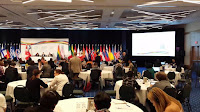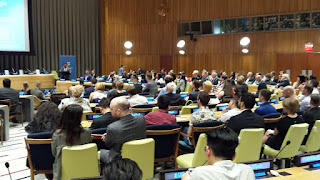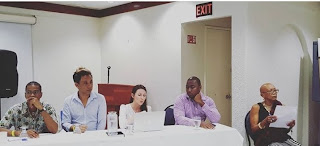The E.R.C: Small economies, L.G.B.T.I Economic Empowerment & Civil Rights Framework
23rd August, 2018
Amazingly, we have a peek into private sector activities, with LGBT consumers. While research numbers vary,a Toronto marketing research firm suggests, gays and lesbians in Canada could have collective incomes of $98 billion and a larger percentage of that is disposable income compared to other people. In the U.S., collective disposable income could be nearly 10 times larger. But what of Belize, we don't have a final tally or even a scenario. Using the Population size estimate of 2018 for men who have sex with men and transwomen collective consumer buying power was estimated between $41,537,746-$121,294,104. While a drop in the economic bucket for many larger economies, begs a question. How does the E.R.C. leverage political and economic action at the national level in small states?
A pragmatic view! What we do know, is that N.G.L.C.C has made progress despite, legal gaps in the United States, in the absence of gay marriage, in the absence of employment protections and in the absence of hate crime legislation. It has foster a global program in the presence of members living in states that criminalizes same sex activity, having no anti-discrimination legislation, no hate crime legislation and no official policy position of the private sector on LGBT issues. In a complementary process, L.G.B.T.I economic empowerment exists side by side with civil rights concerns around the world. It seems L.G.B.T.I economic empowerment is about navigation, gradual visibility and carving out a niche give life to our aspiration for a better quality of life no matter where we live. Such aspiration has been part of our community's DNA for generations, as we resist our oppression and advance our aspirations. If we can mobilize to transform our societies, their remains hope at the end of the E.R.C rainbow to define the substance of its commitment to ensure that private sector is engaged to act in the coming years.
After the Equal Rights Coalition (E.R.C)meeting in Vancouver, member states communique was shared that included language to engage the private sector. It said,"We commit to strengthen relations with the private sector and to work together to foster in all sectors of society, including the workplace, the human rights of L.G.B.T.I persons.." The National LGBT Chamber of Commerce mission defined economic empowerment in is mission as," when an individual or community has an equality of opportunity to participate in, contribute to, and benefit from the formal economy." Indicating a level of systemic thinking and language coordination.
But what does this mean in historical practice? Though, L.G.B.T.I economic empowerment exist within a global systemic context of legal threats, it is because of our concern about our economic standing that we fought so hard to ensure that civil rights advancements were made at the national level. Currently, there are 17 countries which ban propaganda interpreted as promoting LGBT or identities; 72 still criminalizes same sex activity, 8 has the death penalty; a total of 40 countries retain "gay panic" clauses which encourages a justification for murder. In the United States, in 2016, alone eleven states announced they would sue the federal government about directives that impacted transgender students choice of bathroom.
Despite this, hope remains for 20 countries, have paved the way to gay marriage in some form around the world. More than 120 countries have decriminalize in the world, with 26 countries allowing joint adoption and 27 allowing second adoptions. Currently, N.G.L.C.C has initiated a global program to advance LGBT led chambers around the world which complements our civil rights concerns as L.G.B.T.I citizens. Additional actions of the past includes, American Airlines who were the first to endorse a policy of non-discrimination base on sexual orientation and gender identity in 1993. The private sector, in 2016, again added its voice over a bathroom bill in in The State of Georgia. In Singapore, in 2017, L.G.B.T.I organizers got over 100 companies to support their Pink Dot Festival, despite denial by the state for sponsorship request by Singaporean corporations. Thus, making the Equal Rights Coalition commitment in its Vancouver Communique and important leverage framework for millions of L.G.B.T.I citizens around the world.
But what of small economies? The collectively GDP of CARICOM is estimated at $77.7B with a population size of 18,265,523. Trinidad, Jamaica and Bahamas represents the largest economies among member states with an estimated $22B, $14.7B and $12,1B respectively. Equal Rights Coalition members like Argentina, Chile, Ecuador and Costa Rica had an estimated $637.72B, $277.08B, $103.06, $61.5B respectively in 2017. Notably, Belizean G.D.P was estimated at $1,828B with an estimated population of 398,050 people as of July, 2018. With no anti-discrimination legislation, not protection of socio-economic rights and just one functioning Chamber of Commerce, the question must be asked What does L.G.B.T.I economic empowerment look like in a country with less than half a million people and no current legislative protections? This is a question that E.R.C member states must content with in their commitment to engage the private sector as not all economies are created equal.
When I asked airline representatives operating in Belize questions at the N.G.L.C.C marketing expo in Philadelphia about how they operate in small developing countries, I discovered most sub-contracted to a third party while one said they were working to extend benefits given to L.G.B.T.I employees to everyone around the world. The next thing I realize is that economies maybe more product oriented than service oriented. For Belize, there is the Belize Tourism Industry Association, that can be considered the private sector arm of the tourism while the Belize Tourism Board the government side. I don't see the E.R.C engaging the Belize private sector in the next two years. What I see is member states mapping out regional and national spaces to dialogue. What I see is government engaging international chamber of commerce to do peer to peer dialogue. What I see is national networks or advocacy organization engaging the private sector for specific policy positions and supporting research on the economic profiles of L.G.B.T.I consumers. Still, fundamental question in this conversation is, what will the E.R.C consider as an actionable outcome as it engages the private sector? We simply don't know as C.S.O's.
Amazingly, we have a peek into private sector activities, with LGBT consumers. While research numbers vary,a Toronto marketing research firm suggests, gays and lesbians in Canada could have collective incomes of $98 billion and a larger percentage of that is disposable income compared to other people. In the U.S., collective disposable income could be nearly 10 times larger. But what of Belize, we don't have a final tally or even a scenario. Using the Population size estimate of 2018 for men who have sex with men and transwomen collective consumer buying power was estimated between $41,537,746-$121,294,104. While a drop in the economic bucket for many larger economies, begs a question. How does the E.R.C. leverage political and economic action at the national level in small states?
A pragmatic view! What we do know, is that N.G.L.C.C has made progress despite, legal gaps in the United States, in the absence of gay marriage, in the absence of employment protections and in the absence of hate crime legislation. It has foster a global program in the presence of members living in states that criminalizes same sex activity, having no anti-discrimination legislation, no hate crime legislation and no official policy position of the private sector on LGBT issues. In a complementary process, L.G.B.T.I economic empowerment exists side by side with civil rights concerns around the world. It seems L.G.B.T.I economic empowerment is about navigation, gradual visibility and carving out a niche give life to our aspiration for a better quality of life no matter where we live. Such aspiration has been part of our community's DNA for generations, as we resist our oppression and advance our aspirations. If we can mobilize to transform our societies, their remains hope at the end of the E.R.C rainbow to define the substance of its commitment to ensure that private sector is engaged to act in the coming years.
Source:
NGLCC:
CARCOM Reports
Belize's GDP
Belize Population:
Human Rights Watch
Corporations Threaten to Pull Out
States Sue
LGBT relationships
Gay Relationships
Argentina:
Chile
Ecuador
Costa Rica
Vancouver Communique








Comments
Post a Comment